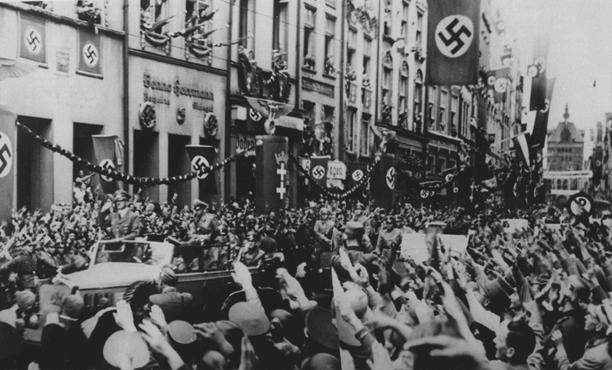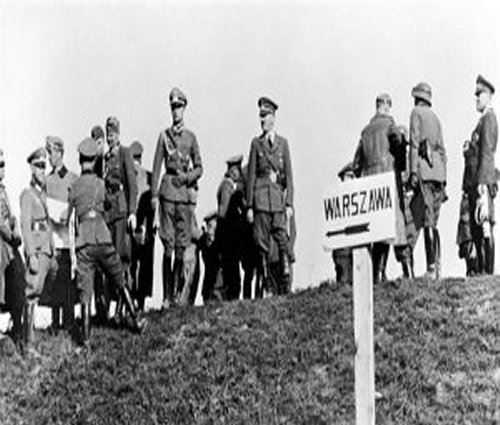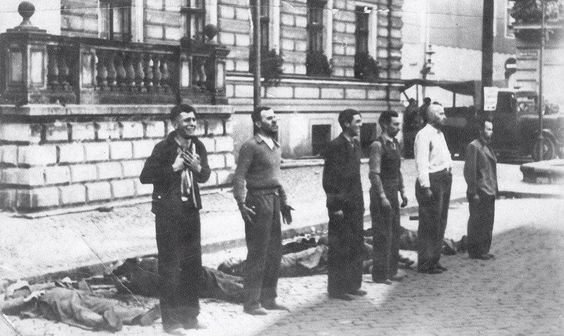Tuesday 19 September 1939
 |
| Adolf Hitler (in the front of the car) enters Danzig (National Archives and Records Administration, College Park, Md.). |
Soviet troops reach the Hungarian border.
Soviet troops take Vilnius after fierce but uncoordinated last-ditch resistance by Polish troops on the city's bridges.
Polish reinforcements from Kutno numbering about 30,000 fight through the German encirclement at the Battle of Wólka Węglowaand and reach Warsaw. It is a tactical victory but a strategic defeat, as Warsaw remains surrounded.
The Luftwaffe switches to bombing Warsaw public utilities.
The Polish Pomorze and Poznan armies (19 Polish divisions, 100,000 troops total) surrender on the Bzura River.
The Germans surround Lviv.
The week-long Battle of Kępa Oksywska in the Oksywie Heights outside the city of Gdynia concludes when pułkownik (Colonel) Stanisław Dąbek. It has been a horrendous battle for the Poles, who were compressed into 4 km² with civilian refugees, with no supplies, and subject to constant Luftwaffe and artillery attack. Polish deaths are roughly 14% of all forces, and virtually every soldier not killed is wounded. The Poles have inflicted huge losses on the Germans but are dwarfed by the Wehrmacht forces opposing them. Col. Dąbek then commits suicide.
Lithuania: Lithuanian troops cross the Lithuanian-Polish border in the direction of Vilnius.
German Propaganda: Adolf Hitler enters Danzig and gives a major speech which defends his alliance with the Soviet Union and suggests that the war could be ended with the status quo (dismemberment of Poland) intact. He makes various vows about Germany forever retaining Danzig and never surrendering.
Holocaust: The Nazis conclude their round of exterminations of Jews in Przemysl.
General Franz Halder, Chief of Staff of the OKH (Military High Command), writes in his diary about communications he has had with Reinhard Heydrich. Heydrich informed him that the SS had begun to "clean house" in Poland of certain undesirable classes: Jews, intelligentsia, Catholic Clergy, and the aristocracy. This is the earliest stage of the Holocaust and Halder does nothing more than writing about it in his obscure diary for posterity. In typical fashion, though, while he actually does nothing about the "cleaning," Halder does note his doubts about the draconian "measures intended by Heinrich Himmler."
American Homefront: The first Batman comic book goes on sale.
 |
| The Allies do not take well to Hitler's Danzig speech. |
September 1939
September 1, 1939: Invasion of PolandSeptember 2, 1939: Danzig Annexed
September 3, 1939: France, Great Britain Declare War
September 4, 1939: First RAF Raid
September 5, 1939: The US Stays Out
September 6, 1939: Battle of Barking Creek
September 7, 1939: Polish HQ Bugs Out
September 8, 1939: War Crimes in Poland
September 9, 1939: The Empire Strikes Back
September 10, 1939: The Germans Break Out
September 11, 1939: Battle of Kałuszyn
September 12, 1939: The French Chicken Out
September 13, 1939: The Battle of Modlin
September 14, 1939: Germany Captures Gdynia
September 15, 1939: Warsaw Surrounded
September 16, 1939: Battle of Jaworów
September 17, 1939: Soviets Invade Poland
September 18, 1939: Lublin Falls
September 19, 1939: Germans, Soviets Hook Up
September 20, 1939: the Kraków Army Surrenders
September 21, 1939: Romania Convulses
September 22, 1939: Joint Soviet-German Military Parade
September 23, 1939: The Panama Conference
September 24, 1939: The Luftwaffe Bombs Warsaw
September 25, 1939: Black Monday for Warsaw
September 26, 1939: Warsaw on the Ropes
September 27, 1939: Hitler Decides to Invade France
September 28, 1939: Warsaw Capitulates
September 29, 1939: Modlin Fortress Falls
September 30, 1939: Graf Spee on the Loose
2019







